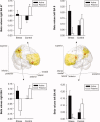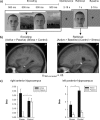Effects of acute psychosocial stress on working memory related brain activity in men
- PMID: 20127868
- PMCID: PMC6870814
- DOI: 10.1002/hbm.20945
Effects of acute psychosocial stress on working memory related brain activity in men
Abstract
Acute psychosocial stress in humans triggers the release of glucocorticoids (GCs) and influences performance in declarative and working memory (WM) tasks. These memory systems rely on the hippocampus and prefrontal cortex (PFC), where GC-binding receptors are present. Previous studies revealed contradictory results regarding effects of acute stress on WM-related brain activity. We combined functional magnetic resonance imaging with a standardized psychosocial stress protocol to investigate the effects of acute mental stress on brain activity during encoding, maintenance, and retrieval of WM. Participants (41 healthy young men) underwent either a stress or a control procedure before performing a WM task. Stress increased salivary cortisol levels and tended to increase WM accuracy. Neurally, stress-induced increases in cortical activity were evident in PFC and posterior parietal cortex (PPC) during WM maintenance. Furthermore, hippocampal activity was modulated by stress during encoding and retrieval with increases in the right anterior hippocampus during WM encoding and decreases in the left posterior hippocampus during retrieval. Our study demonstrates that stress increases activity in PFC and PPC specifically during maintenance of items in WM, whereas effects on hippocampal activity are restricted to encoding and retrieval. The finding that psychosocial stress can increase and decrease activity in two different hippocampal areas may be relevant for understanding the often-reported phase-dependent opposing behavioral effects of stress on long-term memory.
Hum Brain Mapp, 2010. © 2010 Wiley-Liss, Inc.
Figures




References
-
- Braver TS,Cohen JD,Nystrom LE,Jonides J,Smith EE,Noll DC ( 1997): A parametric study of prefrontal cortex involvement in human working memory. Neuroimage 5: 49–62. - PubMed
-
- Declaration of Helsinki ( 2000): 52nd WMA General Assembly, Edinburgh, Scotland, October 2000.
-
- de Quervain DJ,Roozendaal B,Nitsch RM,McGaugh JL,Hock C ( 2000): Acute cortisone administration impairs retrieval of long‐term declarative memory in humans. Nat Neurosci 3: 313–314. - PubMed
Publication types
MeSH terms
LinkOut - more resources
Full Text Sources
Medical
Miscellaneous

